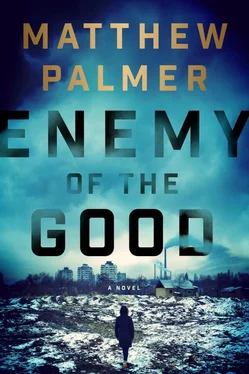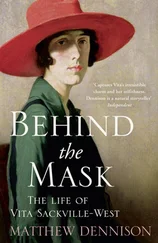“And what about right and wrong? Doesn’t that matter?”
“Of course it does. But right about what? And wrong about what? No set of circumstances outside the lab has only one set of variables.”
“So Eraliev gets a pass on what he did to our family and what he’s doing now to Kyrgyzstan? If he gives us the air base, all is forgiven?”
“It’s a little more nuanced than that. It always is. Values complexity again. We can walk and chew gum at the same time, and we can work with what we have even while we work for change. Look, Kate, Eraliev is a loathsome toad. My job isn’t to like him; it’s to get him to make decisions that are consistent with our interests. Today, that means getting to ‘yes’ on the base deal. But we can also be laying the groundwork for a tomorrow that doesn’t include him. In the long run, a democratic government in Kyrgyzstan aligned with the West will support a broader set of U.S. interests, making it possible for us to do more not only here but in the wider region. You’re absolutely right about that.”
“So what are you doing to make that tomorrow a reality?”
“Have you heard of a group called Boldu? They actually spell their name with an exclamation point. Boldu!” The ambassador raised both his voice and his glass as though it were a toast. A few drops of expensive red wine spilled onto the tablecloth. He seemed not to notice and Kate realized that he had consumed most of the bottle.
“Boldu? It’s the Kyrgyz word for ‘enough.’ Is it a new political party?”
“It’s more a movement. A democracy movement. It’s underground for the time being and incredibly secretive.”
“I would imagine so, after Kyrgyzstan’s last experience with a democracy movement.” Kate’s tone was bitter and her uncle understood.
“I’ve made inquiries about Zamira, Kate. I’ve tried to find out if she’s alive, but I haven’t learned anything. I’m sorry.”
“Mom never gave up hope that her sister was alive somewhere in the black prisons. She was sure of it.”
“And you?”
“I’ll never stop looking. Tell me about Boldu!” Kate imitated her uncle’s exaggerated delivery of the exclamation point.
“There’s not much to tell. We don’t know much. A few months ago, anti-Eraliev graffiti started to appear around town. Some of it quite clever. The signature was either a collective Boldu or someone using the nom de guerre Seitek.”
“As in the grandson?”
“None other.”
The Epic of Manas , a monumental poem meant to be sung and recited by master singers rather than read, was the heart and soul of Kyrgyz culture. It was the Kyrgyz version of the Torah, The Aeneid , The Tale of Genji , and the collected works of Shakespeare all rolled up into one package. The Kyrgyz maintained that the epic poem, nearly twenty times longer than The Iliad and The Odyssey together, was a thousand years old. Modern scholars disputed that figure but would never have dared to challenge it in a bar in Bishkek, many of which were named after Manas or other figures in the epic.
Manas was the father of the Kyrgyz people, who had united the tribes and led them to victory against their enemies. The second book of the Manas epic was devoted to the adventures of his son, Semetei. Seitek was the grandson.
“It’s interesting that he chose Seitek rather than Semetei,” Kate observed.
“How so?”
“Both Manas and Semetei battled the Kyrgyz’ outside enemies. The Oirats, the Uighurs, and the Afghans. Seitek’s enemies were in the palace, ersatz allies and those who had betrayed his grandfather’s legacy. The name alone tells a story. One the Kyrgyz people would understand.”
“We don’t know very much about the man who calls himself Seitek. And he has a good reason for using an alias. Eraliev would like nothing better than to mount his head on a pike at the city gates. Boldu operates in absolute secrecy with a cell-like structure, which makes it hard to penetrate.”
“Have you met with them?”
“No. They won’t meet with us. We’re not even sure how to get in touch with them. It looks like they don’t trust us and paranoia has served them well so far. But there are things that we can do to help them. Money. Training. Media attention. Resources. We want a viable opposition here. We support what Boldu is trying to do. But we need to find some way to make contact with them so we can prove our bona fides. That, Kate, is where you come in.”
“Me?”
“Yes.”
“How? You have a whole team of political officers with many more years of experience than I have. I don’t really see how I can do something they can’t.”
“I’d like to pause to admire that moment of genuine modesty. You don’t hear that often in our line of work. The faux variety certainly, but you, my niece, are entirely sincere and entirely wrong.”
“What can I do?”
“We don’t have a good line into Boldu, but we do have some decent intel on some of the likely members.”
“And?”
The ambassador reached down beside his chair and Kate saw that there was a briefcase sitting there, the kind that opened from the top. Her uncle had put it there earlier, she understood, for just this moment. It was a bit of diplomatic theater.
He set a plain red folder on the table next to her.
“You went to high school with them, Kate.”
The first document was an analytic product from the Defense Intelligence Agency with the subject line “Boldu: An Emerging Challenge to the Eraliev Regime in Kyrgyzstan?” Kate read it through quickly. It was a typical intelligence community piece, heavily caveated with weasel words such as “seems like,” “could possibly,” and “assess with medium confidence.” Even the punctuation was weasly. The question mark in the title was the equivalent of the intelligence community throwing its hands up in the air and saying “your guess is as good as mine.” It might as well have been a shrug emoji. Analysts were always wary of expressing opinions too forcefully lest they be called on to account for their failure to predict the future with absolute fidelity.
This particular product was a leadership analysis, outlining what little the DIA knew about the makeup of Boldu. The putative leader, Seitek, was little more than a name. There were no photographs. His family name was unknown. That did not dissuade one of the psychiatrists on the DIA payroll from offering a sidebar assessment of his personality. Seitek was described as a paranoid narcissist with control issues and an uneasy relationship with his father. Evidently the last Freudian shrink still in business had taken a government job.
The analysts had some more information to work with in describing the makeup of the leadership at the next level, the closest advisors to the elusive Seitek. A number of them, the report noted, were graduates of the International School of Bishkek. The members of the inner circle seemed to rely on personal ties and long-standing loyalties to reduce the risk that Boldu would suffer the same fate as Azattyk, betrayed from within.
The report identified half a dozen suspected members of the Boldu leadership, using the caveats and hedges that Kate found so irritating. Next to three of the names were yearbook photos from their senior year at the International School of Bishkek. ISB included not only the children of diplomats and international businessmen but also the sons and daughters of Kyrgyzstan’s elite and a few exceptionally bright Kyrgyz kids on scholarship. The language of education was English, but more than half the student body held Kyrgyz passports.
Two of the ISB students had graduated in Kate’s year. One—Valentina Aitmatova—had been a friend. She had known the other—Hamid Ismailov—as well, but they had not been close. He had run with the jocks while Kate had spent most of her time with the art nerds and the math geeks. Ismailov had been good enough to make it onto the Kyrgyz wrestling team for the Beijing Olympics, although not good enough to win a single match once he got there. Valentina’s parents were intellectuals. Her Kyrgyz father had taught psychology at the university and her Russian mother was a lawyer. Val herself had always been politically conscious and it was not surprising to Kate that she would be involved with Boldu. Hamid, however, was the son of a wealthy businessman with close ties to the Eraliev government. Kate would not have expected the incurious jock she remembered from high school to grow up a political dissident. But people can change.
Читать дальше












